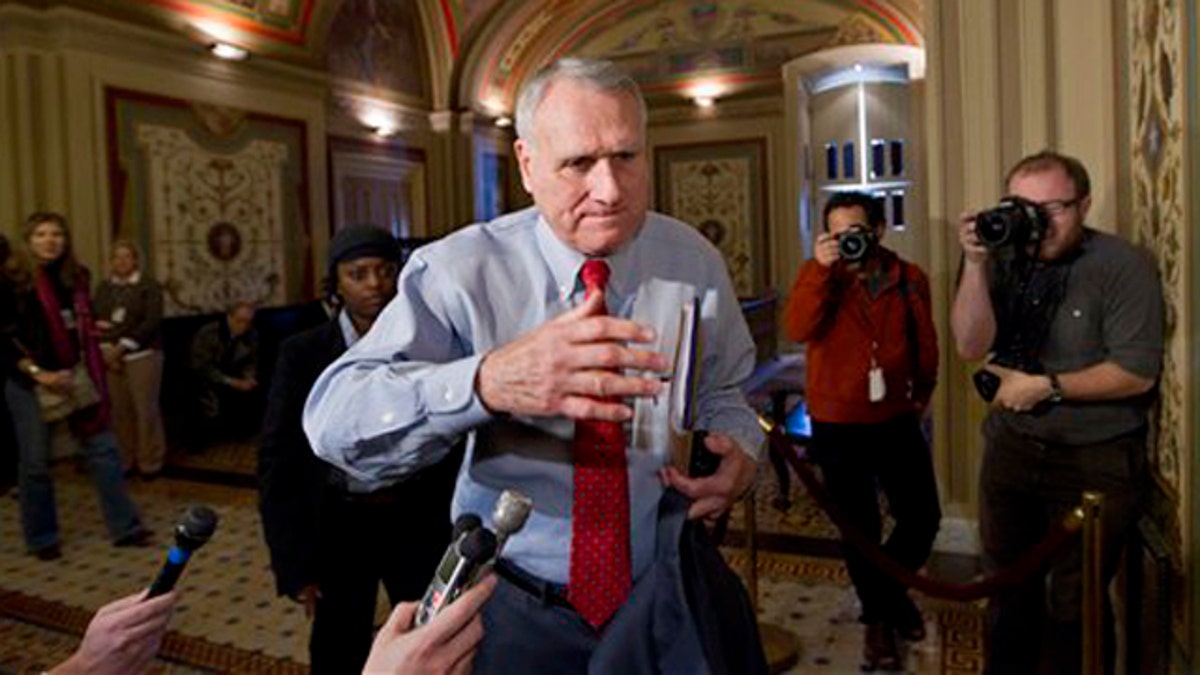
Nov. 18, 2011: Sen. Jon Kyl arrives for a meeting with the bipartisan members of the deficit Super Committee on Capitol Hill in Washington. (AP)
The military, the nation's financial reputation and political careers are hanging in the balance as lawmakers approach the deadline for a deficit deal carrying little more than reasons for why things went wrong.
Following days of dire predictions about the fate of the so-called Super Committee tasked with finding at least $1.2 trillion in savings, the ghost-town scene on Capitol Hill Saturday was not encouraging.
The only member of the so-called Super Committee spotted was Sen. Jon Kyl, R-Ariz., who told reporters that no in-person meetings were planned -- only phone calls.
It was not the typical picture of lawmakers burning the midnight oil in pursuit of a carefully crafted, last-minute deal, the kind Washington is famous for. Instead, reporters, construction workers and tourists made up the bulk of the occupants at the Capitol, with lawmakers home for Thanksgiving break. Escalators in the office buildings were offline, the interior illuminated by the occasional triggering of motion-sensor lights.
Lawmakers held out hope they could produce something, but skepticism was setting in as the window for action narrowed.
Though lawmakers technically have until Wednesday to come up with a package, officials told Fox News that a finished product needs to go to congressional budget scorekeepers by Sunday night to give them enough time to crunch the numbers.
Failure to reach a deal could have far-reaching consequences.
To start, the legislation that originally set up the committee included a mechanism that would "trigger" cuts worth $1.2 trillion if there's no deal. Half those cuts would hit defense, half would hit other programs like entitlements. The committee was established as part of the summer compromise reached to allow an increase in the debt ceiling -- and the "trigger" was meant to compel the committee to do its job.
Not only would Congress face the prospect of mandatory cuts, but lawmakers would be left with no comprehensive plan for extending expiring provisions like tax cuts and jobless aid. A debt plan from the committee, it was hoped, would have served as a sturdy, filibuster-proof vehicle to tow all of these expiring provisions into law. But if the panel fails, a dysfunctional Congress will have to sort it all out.
The 2 percent payroll tax cut expiring in December gave 121 million families a tax cut averaging $934 last year, according to the Tax Policy Center.
Letting extended jobless assistance expire would mean that more than 6 million people would lose benefits averaging $296 a month next year, with 1.8 million cut off within a month.
The problems don't end there.
Lawmakers may make a move to either cough up a relatively small deficit-reduction package and/or tweak the "trigger" mechanism so areas like defense spending are shielded from the automatic cuts.
But some have warned that any of these shortcuts could further imperil the United States' credit rating, or at least severely rattle the financial markets, as it would revive doubts about the ability of America's political leaders to address what is now a $15 trillion national debt.
In the Republican weekly radio address, committee member Sen. Pat Toomey, R-Pa., said it's "not too late" for the U.S. to avoid the financial fate of debt-laden Europe.
"The hour is late. By law, our work on this committee must be completed this coming week. But I remain hopeful that we can meet our goal and I urge my Democratic colleagues to join us in this effort," he said. "We have what is truly a once-in-a-lifetime opportunity to pass legislation that will generate millions of jobs, create a simpler, fairer tax system with lower rates for everyone, and put our government on a path toward fiscal sanity."
The parties have each put up various offers and counter-offers and each time ended up divided over the right balance between spending cuts and tax increases -- and particularly over how and whether to extend or even lower the tax rates enacted during the George W. Bush administration.
A fundraising email blasted out Saturday indicated lawmakers were bracing for the fallout.
The Democratic Congressional Campaign Committee email from House Minority Leader Nancy Pelosi said that while Democrats remain "hopeful" for a deal, Republicans are standing in the way.
"Republicans are insisting on eliminating the Medicare guarantee while cutting taxes for millionaires and refusing to include a robust jobs plan. That's not fair," she wrote, urging supporters to contribute to their end-of-the-month $500,000 goal.
But the political punishment for failure may spread across both parties.
GOP strategist Angela McGlowan said failure would lead to an "anti-incumbent raid" in 2012.
"It's going to hurt Republicans and Democrats," she told Fox News. "The American people, they're going to blame Congress as a whole."
Democratic strategist Doug Schoen said both parties would be at fault for what he described as a potentially "calamitous" situation, though he described Republicans are "more intransigent" throughout this process.
"There's no real glory to be gained for anyone on this one," he said.
Meanwhile, President Obama kept his distance from the debate. Before heading back from a trip to Indonesia and Australia, the president did not mention the Super Committee in his weekly radio address Saturday.
"The president has obviously been engaged in numerous bilateral meetings and group meetings here. He has not made any other calls to leaders of Congress," White House Press Secretary Jay Carney said. "But he is obviously in regular contact with his staff in Washington, including those who are monitoring the Super Committee's progress and engaging with Congress on that issue."
The Associated Press contributed to this report.




